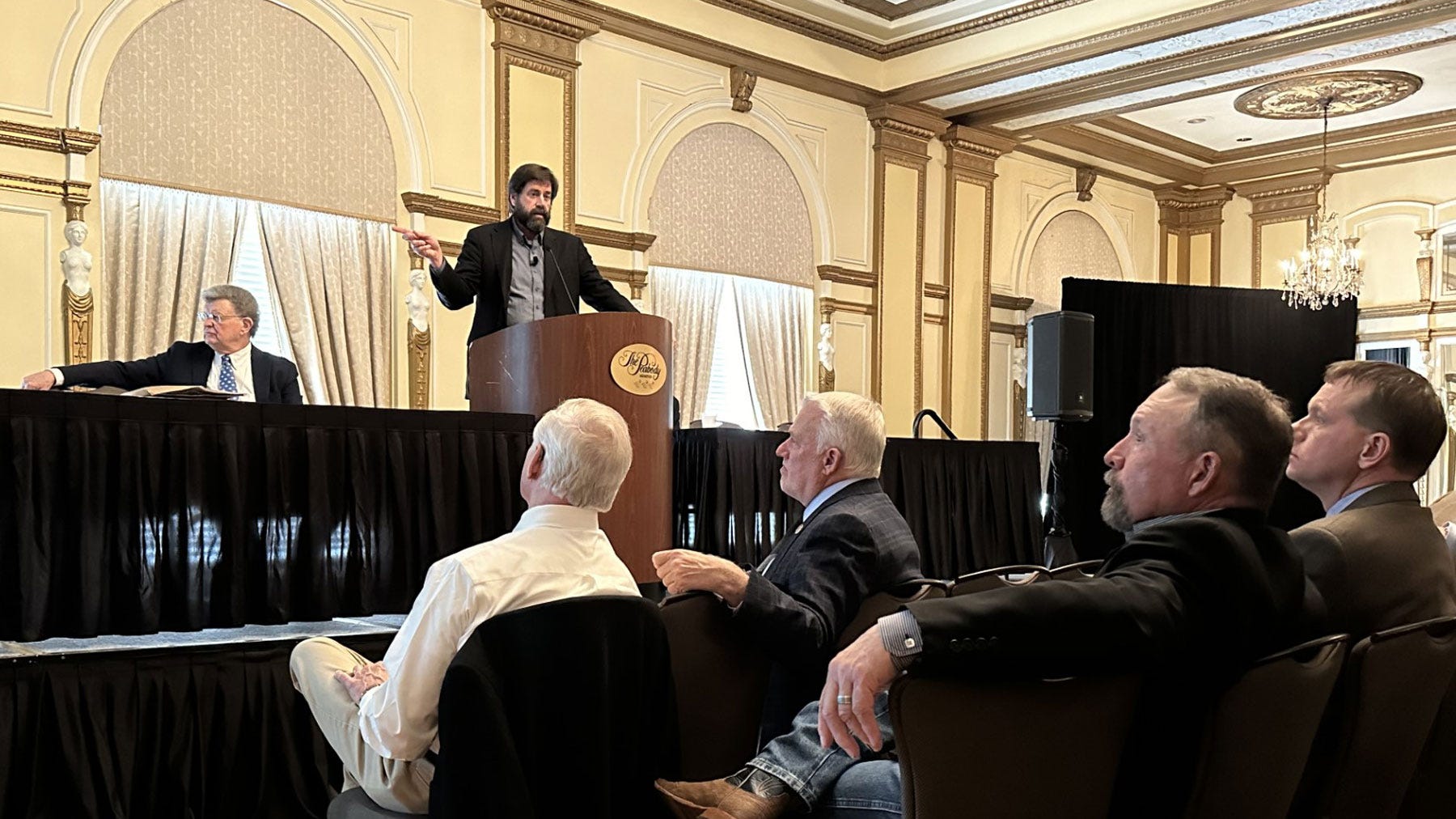
Legal questions often pop up across the agriculture sector. It could be a question about estate taxes or H-2A employment regulations. Perhaps it is an inquiry about cottage food laws or even landowner liability. Fortunately, there is a national resource to help navigate such topics.
Since 1987, the National Agricultural Law Center (NALC) has served the agricultural community as the nation’s leading source for agricultural and food law, research, and information. The center is a stand-alone unit of the University of Arkansas System Division of Agriculture, within the Agricultural Experiment Station and located on the Fayetteville campus.
The NALC is the only center of this nature that is independent, national in scope, and directly connected to the national agricultural information framework. Harrison Pittman has been an attorney at the NALC since 2001 and has served as center director since 2007.
He discussed the center’s tremendous growth and gave an overview of the legal resources available through their dedicated efforts.
Serving the nation’s agricultural community
In his earliest days at the NALC, Pittman was pretty much a one-man-show. He joked recalling his appointment as director and said, “Even then, I was about the only one at the center. There wasn’t much to direct.”
Since then, the NALC has grown exponentially. The center now has two senior staff attorneys, Elizabeth Rumley and Rusty Rumley, along with four staff attorneys, a communications and special projects coordinator, and a website editor.
Additionally, the NALC hires up to 30 research fellows – law students located throughout the U.S. – to work remotely on special assignments and projects.
The NALC has built a strategic network of partners across the country, with four funded by the NALC to provide focused legal expertise. These include: The Ohio State University, Southern University Law Center, the Center for Agricultural Law and Taxation at Iowa State University, the Center for agricultural and Shale Law at Penn State University.
Attorneys, fellows, and partners of the NALC touch every corner of the ag industry, and the center is committed to developing and maintaining scholarly resources that are both relevant and objective.
Pittman said, “Every day, we are constantly in educational content and resource development mode. Any legal development at the state, federal or even international level – from legislative proposals to legislative enactments – we take that complicated information and translate it back to our stakeholders through a variety of resources.”
The NALC does not engage in litigation or advocacy of any kind. Pittman noted that is part of the center’s mission to remain neutral and objective.
"Ultimately, we are a content center here to serve the ag industry,” he said. “It is a big task, and we could not serve our stakeholders without the help of our entire framework of partners.”
Website resources and webinars
While farmers, ranchers, and landowners are an integral part of the NALC’s stakeholder base, Pittman noted the spectrum is much broader. The center also serves attorneys practicing in ag and food law, lenders, farm managers, rural appraisers, crop insurance agents, trade associations, ag departments, and state and federal policymakers.
A variety of resources are readily available on the NALC website, with an index of over 50 relevant topics. All content is free of charge to the general public and includes items like white papers, factsheets, legal briefs, and state statute compilations.
“People visit our website frequently,” Pittman said. “In FY23, if you averaged 365 days a year, we had almost 800 unique visitors to our website each day.”
That translates to about 292,000 unique visitors in 2023 and demonstrates the NALC’s significance to public and private sector stakeholders.
Moreover, the NALC hosts a webinar series, also free of charge and open to the general public. Each month, staff attorneys take a deep dive into some of the most pressing ag and food law issues. These sessions can be viewed live, monthly on the third Wednesday, and recorded sessions are archived and available on the website.
Direct delivery of legal updates
Recently, the NALC celebrated the one-year anniversary of their newest resource, The Feed – an email newsletter delivering the latest developments in ag and food law. At no cost, subscribers receive a list of emerging and noteworthy topics, twice a month directly to their inbox.
Pittman said newsletter recipients range from heads of government affairs for large companies on a global scale to farmers and local leaders on county Farm Bureau boards. “The Feed is designed for everyone of them, and the response has been very positive. We are constantly gaining new subscribers.
“The goal is to keep it relevant and short. We want to uphold our commitment to providing concise updates, and links are included for people to explore more on the topics of interest,” he added.
Additionally, NALC staff are often invited to present in-person to interest groups at the local, state, and national levels. These groups range from attorneys and producers to students and state and federal policy makers.
Nathan Reed, president of the Agricultural Council of Arkansas spoke of the NALC’s presence and impact. He said, “We are extremely fortunate that the National Ag Law Center is located right here in Arkansas, and what a tremendous resource it is to our industry. The National Ag Law Center does fantastic work, and Harrison has developed a great staff that can dive deep into complex subject matter.”

Pittman recently delivered a presentation on some of the most pressing topics in agricultural law to attendees of the Southern Cotton Ginner's Association. (Photo by Whitney Haigwood)
National ag and food law conferences
Each summer, the NALC hosts the Mid-South Agricultural and Environmental Law Conference at the Cecil C. Humphry’s School of Law at the University of Memphis in Tennessee. Last summer marked the 10th annual conference, and Pittman looked back at the initial event a decade ago.
“I remember when there was a first annual Mid-South conference. It was kind of a leap of faith that we even called it the first annual, because there were no guarantees,” Pittman said.
That year, the event was held at Harrah’s Casino in Tunica, Miss. Pittman said they did their best to advertise with resources at the time, and to his surprise, there was a great turnout. Around 50 attendees came from Arkansas, Mississippi, and Tennessee.
The following year, Memphis became an option for the conference. It has been the site since, with a centralized location ideal for travel by plane or car. Attendance grows annually, with conference participants representing up to 14 states nationwide.
Last year, the NALC conference expanded with the first annual Western Agricultural and Environmental Law Conference, a successful two-day event in Reno, Nev.
Pittman said both conferences are specifically tailored to stakeholders. A registration fee is required and continued education credits are typically available for legal, real estate, farm management, and rural appraisal.
While Pittman is working to finalize this year’s agendas, he said attendees can expect sessions on corporate reporting requirements, foreign ownership, estate planning, warrantless searches, and pesticide regulations.
For more information about the NALC, you can visit their website. You can also find a link to subscribe to The Feed newsletter.
About the Author(s)
You May Also Like






